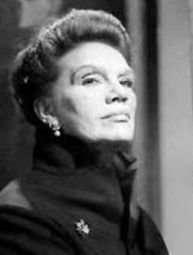
Elisabeth Ida Marie Flickenschildt was a German actress, producer and author. She appeared in dozens of German language films and television productions between 1935 and 1976.

Willy Birgel, born Wilhelm Maria Birgel, was a German theatre and film actor.
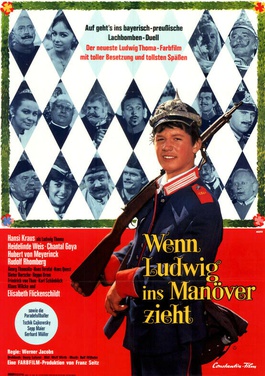
When Ludwig Goes on Manoeuvres is a 1967 West German historical comedy film directed by Werner Jacobs, starring Hansi Kraus as Ludwig Thoma, Heidelinde Weis and Rudolf Rhomberg. The script was provided by producer Franz Seitz who chose his pen name "Georg Laforet" for the credits. Besides many well-known actors of the day, the film also features Zlatko Čajkovski, 1967's trainer of FC Bayern Munich, his goal-getter Gerd Müller and his goalkeeper Sepp Maier.
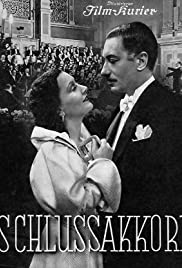
Schlußakkord is a German film melodrama of the Nazi period, the first melodrama directed by Detlef Sierck, who later had a career in Hollywood as Douglas Sirk and specialised in melodramas. It was made under contract for Universum Film AG (UFA), stars Lil Dagover and Willy Birgel and also features Maria von Tasnady, and premièred in 1936. It shows stylistic features later developed by Sierck/Sirk and makes symbolic and thematic use of music.

Tannenberg is a 1932 Swiss–German war film directed by Heinz Paul and starring Hans Stüwe, Käthe Haack and Jutta Sauer. The film is based on the 1914 Battle of Tannenberg during the First World War. It focuses on a German landowner Captan von Arndt and his family.
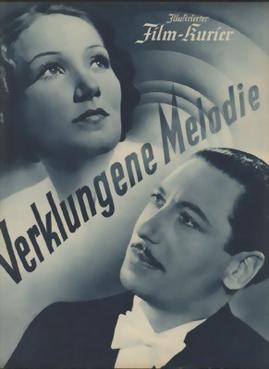
Faded Melody is a 1938 German drama film directed by Viktor Tourjansky and starring Brigitte Horney, Willy Birgel and Carl Raddatz. The film was made by Germany's largest studio of the era UFA. It was shot at the Babelsberg Studios in Potsdam and on location in French Algeria, New York City and Berlin. The film's sets were designed by the art directors Hermann Asmus and Max Mellin. It premiered at Berlin's Gloria-Palast.

Maria Ilona is a 1939 German historical drama film directed by Géza von Bolváry and starring Paula Wessely, Willy Birgel, and Paul Hörbiger. The film is set in Austria during the reign of Ferdinand I. It is an adaptation of Oswald Richter-Tersik's novel Ilona Beck.
Diesel is a 1942 German biographical film directed by Gerhard Lamprecht and starring Willy Birgel, Hilde Weissner, and Paul Wegener. It portrays the life of Rudolf Diesel, the German inventor of the diesel engine. It was one of a series of prestigious biopics made in Nazi Germany portraying genius inventors or artists struggling against the societies in which they live. The film was based on a biography by Eugen Diesel, one of Diesel's children.

I Need You is a 1944 German comedy film directed by Hans Schweikart and starring Marianne Hoppe, Willy Birgel and Paul Dahlke. The film's sets were designed by the art director Hans Sohnle.

Count Woronzeff is a 1934 German film directed by Arthur Robison and starring Albrecht Schoenhals, Hansi Knoteck and Willy Birgel. A separate French version The Secret of Woronzeff was also released. It was shot at UFA's Babelsberg and Templehof Studios in Berlin. The film's sets were designed by the art directors Erich Kettelhut and Max Mellin. Location filming took place in Cannes on the French Riviera.

Riding for Germany is a 1941 German drama film directed by Arthur Maria Rabenalt and starring Willy Birgel, Gertrud Eysoldt and Gerhild Weber. A German cavalry officer, badly injured during the First World War, emerges as a leading competitor in post-war equestrian events.

When the Evening Bells Ring is a 1951 West German drama film directed by Alfred Braun and starring Willy Birgel, Maria Holst and Paul Hörbiger. It was shot at the Tempelhof Studios in West Berlin with sets designed by the art director Gabriel Pellon. It is unrelated to the 1930 silent film of the same title.

Enemies is a 1940 German drama film directed by Viktor Tourjansky and starring Brigitte Horney, Willy Birgel and Reinhold Lütjohann. The film was a Nazi propaganda work, attacking Poland which Germany had invaded the year before. The film's sets were designed by Herbert Hochreiter, Alfred Metscher and Julius von Borsody.
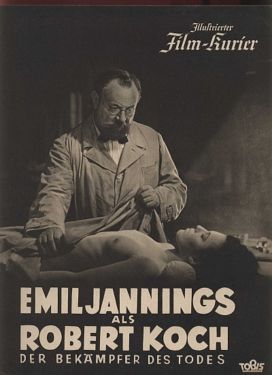
Robert Koch is a 1939 Nazi propaganda film directed by Hans Steinhoff and starring Emil Jannings, Werner Krauss and Viktoria von Ballasko. The film was a biopic of the German pioneering microbiologist Robert Koch (1843–1910). It was shot at the Johannisthal Studios in Berlin and premiered at the city's Ufa-Palast am Zoo. The film was made by the Tobis Film company, and was also distributed in the United States by the largest German studio UFA.

Two Times Lotte is a 1950 West German film, directed by Josef von Báky and starring Antje Weisgerber, Peter Mosbacher, Isa, and Jutta Günther. It was made by Bavaria Film at the Emelka Studios near Munich, and its sets were designed by the art directors Robert Herlth and Willy Schatz.

The Chaplain of San Lorenzo is a 1953 West German drama film directed by Gustav Ucicky and starring Willy Birgel, Dieter Borsche and Gertrud Kückelmann. It was shot at the Bavaria Studios in Munich. The film's sets were designed by the art directors Robert Herlth and Gottfried Will.
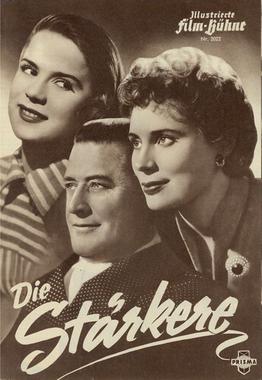
The Stronger Woman is a 1953 West German drama film directed by Wolfgang Liebeneiner and starring Gertrud Kückelmann, Hans Söhnker and Antje Weisgerber. It was shot at the Tempelhof Studios in West Berlin and on location at the Schloss Büdingen. The film's sets were designed by the art directors Emil Hasler and Walter Kutz.

The Governor is a 1939 German drama film directed by Viktor Tourjansky and starring Brigitte Horney, Willy Birgel and Hannelore Schroth. It is based on the play Die Fahne by Emmerich Groh. It was shot at the Babelsberg and Tempelhof Studios in Berlin and on location in East Prussia. The film's sets were designed by the art director Max Mellin. It was produced on a budget of 715,000 Reichsmarks.

The Merciful Lie is a 1939 German drama film directed by Werner Klingler and starring Hilde Krahl, Elisabeth Flickenschildt and Ernst von Klipstein. It was shot at the Johannisthal Studios in Berlin and on location in Bremen. The film's sets were designed by the art directors Karl Böhm and Erich Czerwonski.

A Love Story is a 1954 West German historical romantic drama film directed by Rudolf Jugert and starring Hildegard Knef, O.W. Fischer and Viktor de Kowa. It was shot at the Wandsbek Studios in Hamburg and on location in Celle and Umgebung. The film's sets were designed by the art directors Erich Kettelhut and Johannes Ott. It was produced by Erich Pommer's independent company Intercontinental Film. It was part of the tradition of Prussian films, which had enjoyed great popularity in the Weimair and Nazi eras.



















